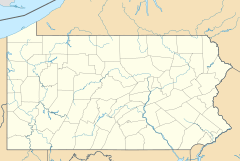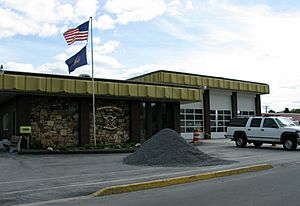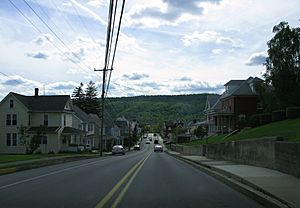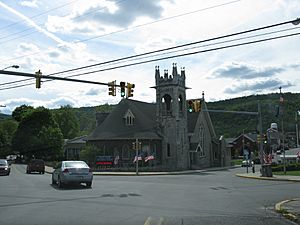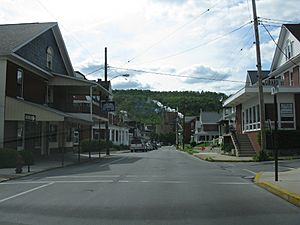Roaring Spring, Pennsylvania facts for kids
Quick facts for kids
Roaring Spring, Pennsylvania
|
|
|---|---|
|
Borough
|
|
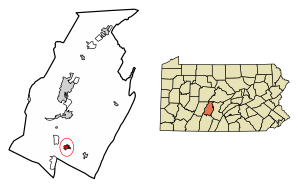
Location of Roaring Spring in Blair County, Pennsylvania.
|
|
| Country | United States |
| State | Pennsylvania |
| County | Blair |
| Settled | 1865 |
| Incorporated | 1888 |
| Government | |
| • Type | Borough Council |
| Area | |
| • Total | 0.81 sq mi (2.09 km2) |
| • Land | 0.81 sq mi (2.09 km2) |
| • Water | 0.00 sq mi (0.00 km2) |
| Elevation | 1,027 ft (313 m) |
| Population
(2020)
|
|
| • Total | 2,384 |
| • Density | 2,961.49/sq mi (1,143.23/km2) |
| Time zone | UTC-5 (Eastern (EST)) |
| • Summer (DST) | UTC-4 (EDT) |
| Zip code |
16673
|
| Area code(s) | 814 |
| FIPS code | 42-65256 |
| GNIS feature ID | 1202160 |
| Website | Roaring Spring |
Roaring Spring is a small town, called a borough, in Blair County, Pennsylvania, USA. About 2,392 people lived there in 2020. It is part of the larger Altoona, PA area.
Contents
Discovering Roaring Spring's Past
Roaring Spring was founded around a large, clear spring. This spring was very important for a paper mill built there. Before 1866, the area was just a small village with a grist mill and a country store. The grist mill used water from the spring and had been working since the 1760s.
How the Town Grew
After the paper mill started in 1867, it grew quickly. More land was bought to build homes for new workers. The town didn't have a strict plan for its streets. Because of this, the streets look a bit random. This is due to the hilly land, old country roads, and how different pieces of land were bought over time.
The main streets in Roaring Spring are East Main, West Main, Spang, and Bloomfield. These roads lead out of the borough to nearby areas. Spang and East Main Streets meet with Church Street at a busy spot called "Five Points." The town grew mostly in the areas developed by the early 1920s. This area covers about 233 acres. Most buildings built after the 1920s filled in empty spaces in these already developed areas. In the 1960s, Roaring Spring added parts of nearby Taylor Township, especially around the new Route 36 Bypass.
Early Development and Changes
In 1865, Daniel Mathias (D. M.) Bare created the first 50 building lots in Roaring Spring. He and two partners decided to build the region's first paper mill near the spring. These lots were in the center of the village, near West Main, Spang, and East Main Streets.
By 1873, the borough had about 170 lots and 50 buildings. These included the paper and grist mills, three churches, a company store, a school, and a hotel. The population was around 100 people. This central area remained the main business part of town until 1957. That's when the Route 36 bypass was built to the east of town. Like many small towns, many shops moved to the new highway. The old town center still has some shops and offices. It is also home to the Roaring Spring Blank Book Company and Roaring Spring Water Bottling Company. All the historic church buildings, the public library, the borough building, and the post office are still there too.
Geography and Natural Features
Roaring Spring is located at 40°20′04″N 78°23′55″W / 40.334494°N 78.398512°W.
The borough covers about 0.8 square miles (2.1 km2) of land. There is no water area within the borough limits.
The Spring Dam
The town is famous for its natural spring. This spring flows into a pond, which locals call the Spring Dam. The Spring Dam has many large fish. The water is very clear, so you can see all the way to the bottom of the pond.
Education in Roaring Spring
Roaring Spring is part of the Spring Cove School District.
The Spring Cove School District's main offices are in Roaring Spring. The district has two elementary schools, Spring Cove Elementary and Martinsburg Elementary. It also has Spring Cove Middle School and Central High School. The district serves several townships and towns, including Roaring Spring and Martinsburg. You can find more information on their website: http://springcove.schoolnet.com/.
Population and People
| Historical population | |||
|---|---|---|---|
| Census | Pop. | %± | |
| 1880 | 489 | — | |
| 1890 | 920 | 88.1% | |
| 1900 | 1,344 | 46.1% | |
| 1910 | 1,903 | 41.6% | |
| 1920 | 2,379 | 25.0% | |
| 1930 | 2,724 | 14.5% | |
| 1940 | 2,724 | 0.0% | |
| 1950 | 2,771 | 1.7% | |
| 1960 | 2,937 | 6.0% | |
| 1970 | 2,811 | −4.3% | |
| 1980 | 2,962 | 5.4% | |
| 1990 | 2,615 | −11.7% | |
| 2000 | 2,418 | −7.5% | |
| 2010 | 2,585 | 6.9% | |
| 2020 | 2,392 | −7.5% | |
| 2021 (est.) | 2,365 | −8.5% | |
| Sources: | |||
In 2000, there were 2,418 people living in Roaring Spring. These people made up 1,019 households, with 706 of them being families. The population density was about 3,020.5 inhabitants per square mile (1,166.2/km2). There were 1,087 housing units in the borough.
Most of the people in Roaring Spring were White (98.92%). A small number were African American, Native American, Asian, or Pacific Islander. Some people identified with two or more races.
Households and Age
Out of all the households, 30.3% had children under 18 living with them. About 54.1% were married couples. Around 11.3% were households led by a female without a husband present. About 30.7% were not families.
Roughly 27.2% of all households had only one person living there. About 14.5% of households had someone aged 65 or older living alone. The average household had 2.37 people, and the average family had 2.88 people.
The population was spread out by age. About 22.5% were under 18. Around 9.3% were between 18 and 24. About 28.0% were between 25 and 44. Around 23.3% were between 45 and 64. And 16.8% were 65 years or older. The average age was 38 years.
Income Information
In 2000, the average income for a household in Roaring Spring was $35,329. For families, the average income was $42,370. Men earned about $31,643 on average, while women earned about $24,352. The income per person in the borough was $17,972.
About 8.0% of families and 10.2% of the total population lived below the poverty line. This included 17.0% of those under 18 and 9.5% of those aged 65 or older.
Notable People from Roaring Spring
- Ronald Mallett, a physics professor known for his theories on time travel.
See also
 In Spanish: Roaring Spring para niños
In Spanish: Roaring Spring para niños
 | Janet Taylor Pickett |
 | Synthia Saint James |
 | Howardena Pindell |
 | Faith Ringgold |


